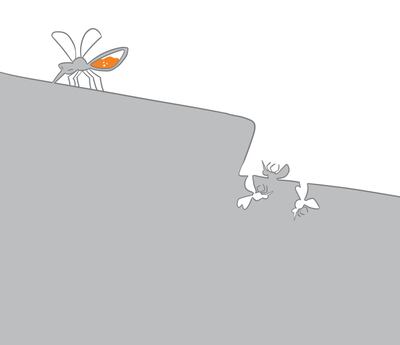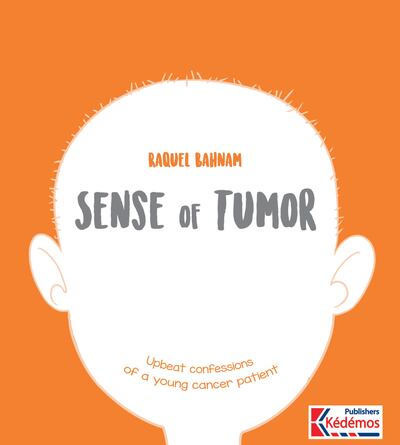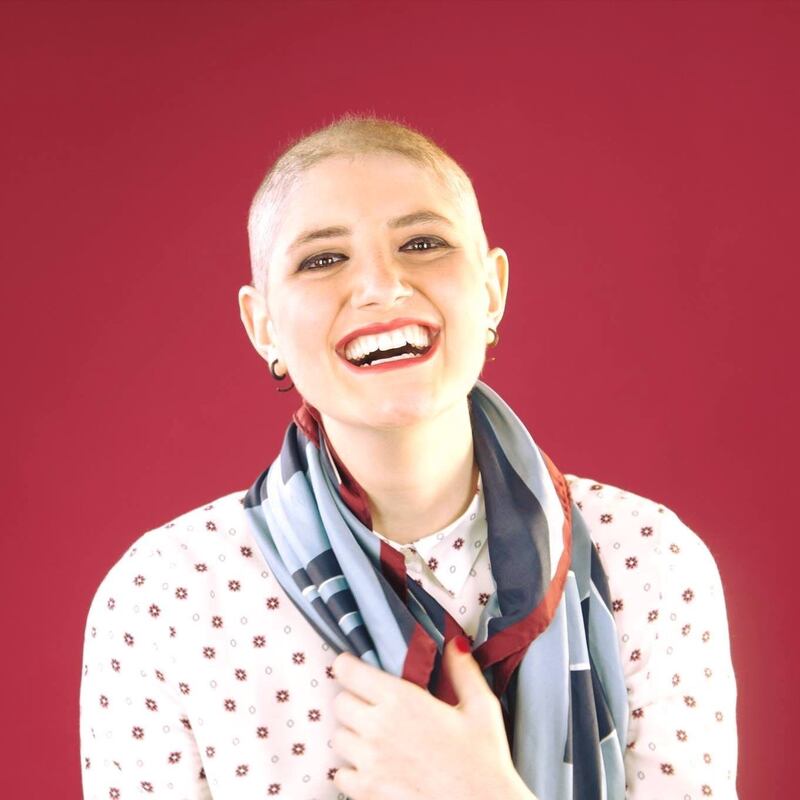Above an illustration of a mosquito, its proboscis busily sucking and its body full of bright red blood, are the words: “Mosquitos suck! They do, and the odds are they’ve sucked some drugs off me and never knew what hit them! I only realised that when I found a bunch of dead flies lying next to me every time I woke up.”
Conveying the horror of chemotherapy – in which poison is pumped into the human body, testing it to its limits – with wry dark humour, this passage encapsulates the bravery and wit of Sense of Tumor: Upbeat Confessions of a Young Cancer Patient, a short, illustrated book by Lebanese author Raquel Bahnam the book is an unusual and moving journey through the realities of life with cancer.

Bahnam was just 21 years old when she was diagnosed with T-cell acute lymphoblastic leukaemia, a rare form of blood cancer. She first began to experience low energy and a persistent cough while in her final year of a degree in advertising at the Lebanese Academy of Fine Arts, but several visits to the doctor resulted in nothing more than a prescription for herbal medicine.
“I was misdiagnosed for over a year before my body finally gave up,” she recalls. “Eventually, we went to the emergency room and the first thing they did was an x-ray. In it they saw a huge tumour, maybe 23cm, in my chest.”
Bahnam spent two weeks in intensive care before beginning a course of chemotherapy that lasted 10 months. Throughout the pain of the treatment and in the face of her natural fear, Bahnam sought strength in humour, striving to remain positive and see the funny side of what she was going through.
With poignant wit, she writes about the struggle she and her family went through in the wake of her diagnosis, searching for signs or triggers all the way back to childhood. “The doctor reassured us: neither my habit of eating soil nor my awkward habit of chewing the toilet brush had anything to do with my leukaemia,” she writes.
Bahnam puts her ability to stay positive during her treatment down to a naturally sunny disposition, which she says she inherited from her mother. “I was born with a smiley face,” she says. “Even when I was in my darkest times and I’d ask for painkillers that were so strong, people would think, ‘You probably don’t need such strong painkillers, you’re not in that much pain,’ and I’d be dying of pain, but nobody believed me because of that smile.
“Later on, everybody started noticing that’s how I am and because of that they started behaving a bit differently with me than the other patients,” she continues. “This gave me so much comfort because they understood that that’s what I need and that’s how I am. The fact that I was understood helped a lot to keep me positive … Once I felt comfortable, automatically my positivity and my natural sense of humour came back.”
It was only after her treatment, once she went into remission and was declared cancer-free, that Bahnam had the idea to turn her experiences into a book. “Normally people think that when you’re in remission things are good, but actually this is when I got depressed,” she explains. “I felt like I needed chemotherapy as part of my life, otherwise I’m not going to make it. I felt so alone, especially because all my friends had already started working, they had experience already, and I had nothing. So I decided to do something productive.”

During her treatment, Bahnam chose not to wear a wig to conceal the hair loss caused by chemotherapy. She was struck by the fact that she didn’t see any other cancer patients out in public. “What pushed me to write this book was knowing that Lebanon, even though it’s the smallest country in the Middle East, has the highest rates of cancer diagnoses, and I was wondering, ‘Where are all these cancer patients? Why don’t I see anybody leaving the house without a wig?’” she recalls.
In choosing to go out without hiding her illness, Bahnam says she felt confident and powerful. And she was pleasantly surprised by gestures of support and kindness from strangers. “I continued living my life very normally, very peacefully and positively, and every single time I went out at least two or three people would come over and tell me some words of encouragement, something supportive, whether they shared their own personal story with me or whether they just smiled at me,” she says.
Sense of Tumor charts Bahnam's mental and physical journey, from her early symptoms, to her diagnosis and treatment, to her eventual remission. By turns funny and sad, it explores the side effects of chemotherapy, including mood swings, weight loss followed by weight gain, forgetfulness – a side effect known as "chemo brain" – an enhanced sense of smell and a fluctuating sense of taste. Bahnam also shares the ways she learned to conquer her fear, and includes a funny section on the unexpected "perks" of being a cancer patient, from no longer needing to shave, to being excused from household chores.
A powerful and moving book, it provides insight into a taboo topic for a wide range of readers. “It’s not just for cancer patients. Anybody could read it – kids, old people, healthy people, sick people – anyone,” says Bahnam.
One week after celebrating her first year of remission, Bahnam found out that her cancer had returned. "Automatically when blood cancers come back you have to have a bone marrow transplant, otherwise it's always going to keep coming back again and again for your entire life until the chemo kills you," she explains, speaking to The National by phone from her bedroom, where she must spend three months in isolation recovering from the transplant, unable to have visitors or even to go into the kitchen or living room.
___________________
Read more:
Dubai-based charity gives sick children a superhero boost
WATCH: Young cancer patients from GCC turn into superheroes for a day in London hospital
Sheikha Fatima makes large gift to paediatric research centre in London
___________________
Bahnam’s book was published by Lebanese publisher Kedemos, which offered to waive the publishing costs. She recently donated the equivalent money to a fundraiser for a hospital in the southern suburbs of Beirut. It is severely underfunded, she says, but is one of only three hospitals in Lebanon that offers bone marrow transplants. “I think it’s unfair for some people to choose to die and not have that transplant that I had, just because it costs about $120,000 (Dh440,700) and it’s not covered by the government at all, and the insurance barely covers up to $38,000,” she says. “I’ve heard stories of people who would rather die than live and have their families spend so much on something where you have about a 20 per cent chance of mortality.”
Despite all she has been through, Bahnam remains positive. “I had a tough time growing up, and trusting people was not really my thing, but after this experience I could proudly and so confidently tell you that cancer was the best thing that ever happened to me in my entire life,” she says. “Why? Because in spite of everything that it took from me, it gave me so many things. It restored my faith in humanity … I never felt alone during that time. I still don’t.
“The most important thing it has given me is family … and love … and support. I don’t know which one to choose. It’s such a strong feeling that I can never put behind me.”
Sense of Tumor: Upbeat Confessions of a Young Cancer Patient, published by Kedemos, is out now






